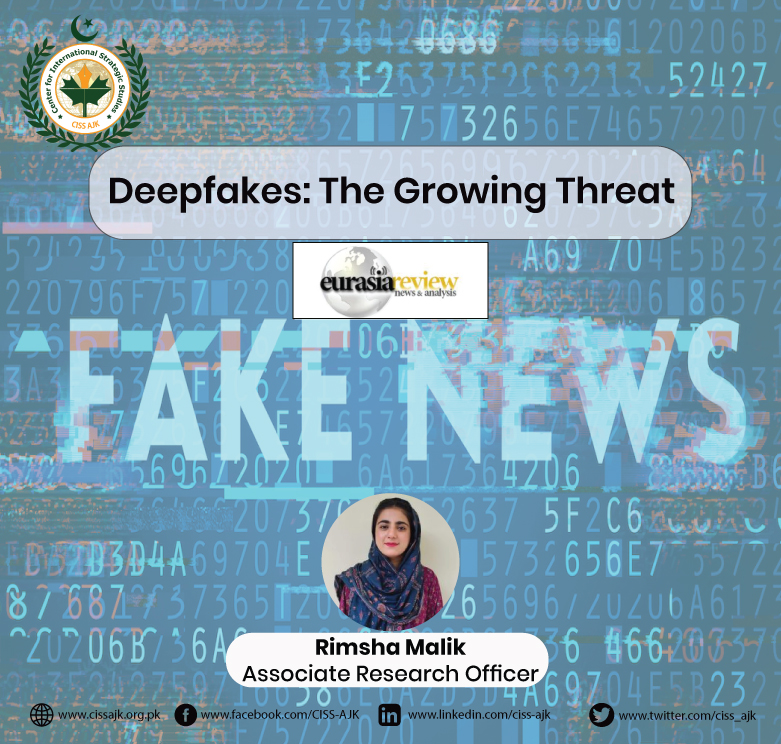636
Fake news is not a new phenomenon; its origins can be found in the 13th century BC, under the reign of Rameses the Great. But in the 20th century, it rose to popularity, most notably as a propaganda tool during both World Wars. Fake news spread much more quickly after the Internet was introduced in the late 1990s because it was now more widely available and had more influence. Nowadays, misinformation is being used by powerful people and even governments to manipulate public opinion, making fake news a worldwide issue.
The story then turns to the introduction of Deepfake, a new technological danger. Deepfake creates or modifies movies to represent events that never happened by using machine learning, particularly deep learning algorithms. In itself, the word combines the terms “deep learning” and “fake.” Even while Hollywood has always used these kinds of deception strategies, the bar has been considerably lowered. Those who have a gaming laptop, an internet connection, and a basic understanding of neural networks may now make convincing phony films. Certain programs streamline the procedure to a mere click-based face-swapping encounter.
An anonymous user going by the handle u/deepfakes started a community on Reddit called r/deepfakes in November 2017, which marked the beginning of the Deepfake technology. Face-swapping films using the Deepfake algorithm were first created for this reason, and over time they have developed into incredibly lifelike and difficult-to-identify depictions of people speaking or doing things they never really did. Technology development raises serious risks to the integrity of society and people’s reputations by expanding the possibility of producing convincingly fake recordings that target politicians, celebrities, and governments.
A few instances highlight how Deepfake videos can be used as a tool for psychological or political manipulation, even though the majority of them are made for entertainment purposes. One example is a video that purports to support Belgium’s exit from the Paris Climate Agreement and features former US President Donald Trump. A Belgian political party posted the video on Facebook and Twitter, but fact-checkers later refuted it.
The power and possible consequences of fake news and face-swapping technologies are further illustrated with a film that features comedian Jordan Peele’s mouth digitally added into an original clip of former US President Barack Obama.
These incidents underline the necessity of increased awareness and forceful action to counter the growing risks that Deepfake films offer across a range of platforms. The effects of deepfake footage in the initial months of Russia’s invasion of Ukraine. Artificial intelligence (AI)-manipulated deepfakes can produce false yet realistic videos of occurrences. According to the study, there have been cases of consumers becoming confused and doubtful about deepfakes and accusing real videos of being fraudulent. Deepfakes have the ability to disseminate counterfactual messages from reliable sources, as evidenced by the notable deepfake video of President Zelensky making an incorrect assertion about the conclusion of the war. Because deepfakes have the potential to undermine trust in legitimate media and feed conspiracy theories. Detection technology is not foolproof, making skepticism and verification crucial.
Apart from the political sphere, firms encounter distinct obstacles. Deepfake technology has been used to imitate business executives, which has resulted in financial fraud and breaches of sensitive data. Proactive cybersecurity measures are necessary in light of the financial and reputational harm caused by these dishonest actions. Additionally, deepfakes have changed the way that social engineering assaults are conducted. Once very simple, phishing attempts have evolved into more devious tactics by utilizing modified audio and video content. Workers and people now need to be extra careful to distinguish real communications from well-planned deepfakes.
The possible effects of deepfakes on national security are too important to overlook on a global basis. The stability of nations is seriously threatened by military deception, strategic disinformation efforts, and the fabrication of narratives. Global governments are realising that to meet these changing problems, comprehensive cybersecurity plans are required.
The fight against deep fakes is fortunately still ongoing. New avenues for creative solutions are being opened up by developments in artificial intelligence and machine learning. Scholars and cybersecurity professionals are working together to keep one step ahead of criminals through the use of blockchain-based authentication and automated detection algorithms. Human awareness and education play a critical role in the fight against deepfakes. Deterrents can be effectively employed when people are taught to evaluate digital content critically.
Moreover, awareness-raising and training initiatives should concentrate on identifying and reducing deepfake risks to tackle the deepfake issue. National crisis-response centres must establish a specialised unit for the detection of deepfakes share information and coordinate operations across international borders. Monitoring programs should be expanded to detect altered information, and cybercrime units should be outfitted with the tools necessary to look into and bring charges for events involving deepfakes around the world. Furthermore, technology solutions for access control, encryption, identity management, and general operational security should be given top priority in research and development initiatives. Though it emphasizes constant adaptation to changing deepfake threats and the incorporation of legal frameworks to specify obligations in resolving deepfake occurrences, the dynamic management perspective is still crucial.
Rimsha Malik
Rimsha Malik is an Associate Research Officer at Centre for International Strategic Studies AJK.



